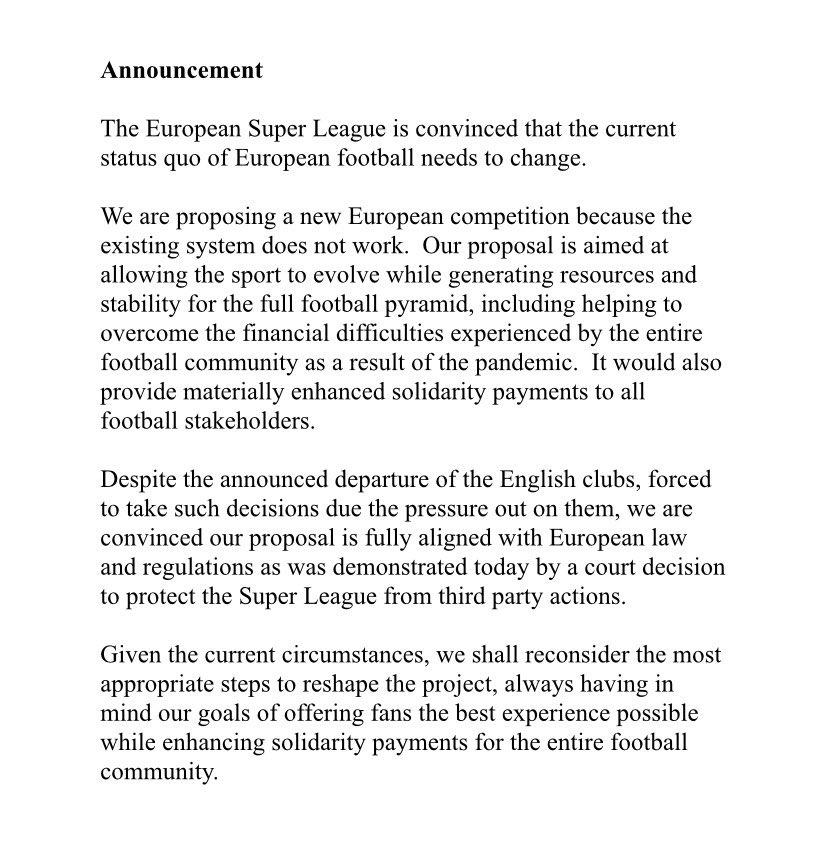If you have a friend or loved one who’s an ardent football fan, you’re probably wondering why they’ve been so angry and upset lately.
After all, they’re not an Arsenal fan, so what’s there to be unhappy about?
One word: European Super League.
Reader: That’s like three words.
On 18 Apr, a group of 12 European clubs announced their plans to launch a new football competition called the European Super League.
The organisers of this new league likely expected the move to receive a little negative reaction, but instead, the whole footballing world came down on them like a mammoth fiery asteroid from outer space.
Football fans, players, and pundits roared in furious unison, demanding that plans for the league be cancelled.
And they might soon have their wish granted.

But before we get to that, what exactly is the European Super League, and why was everyone up in arms about it?
Well, here are 10 facts about the European Super League, the league no football fan wants to see.
European Super League is Unlike Any Other Football Competition
The European Super League (ESL) was formed by 12 founding clubs, including Manchester United, Liverpool, Barcelona, and Real Madrid.
According to the clubs’ statement, another 8 clubs would join the league, forming a league of 20.
Unlike every other football competition, however, the clubs wouldn’t have to qualify for it every year.
Typically, in the English Premier League (EPL), the top four clubs would qualify for the UEFA Champions League, a competition which the ESL is trying to replace.
If the ESL went ahead as planned, these clubs would qualify for the competition even if they finished last in the EPL table and were relegated to a lower division.
What outraged fans was that these clubs believed they were entitled to a place in such a prestigious competition solely because of their past achievements.
Some clubs in the ESL, like Arsenal, Tottenham Hotspur, and even Manchester United, haven’t won any important competitions in recent years, but still believe they should qualify for the ESL every year because they’re a “big” club.
European Super League Would Involve 20 Teams Split into Two Groups
When plans for the ESL were confirmed, 15 founding clubs were said to be involved.
Of these, only 12 were named:
- Manchester United
- Liverpool
- Manchester City
- Arsenal
- Chelsea
- Tottenham Hotspur
- Barcelona
- Real Madrid
- Atlético Madrid
- Juventus
- AC Milan
- Inter Milan
As you can see, six clubs are from the English Premier League (EPL), three are from La Liga, and another three are from the Italian Serie A.
Another five clubs were supposed to be invited to join these 15 clubs by qualifying based on their previous seasons’ achievements.
This was the proposed structure for the league:
Two groups of 10 will play home and away matches, and the top three in each group will automatically qualify for a knockout stage.
Clubs in fourth and fifth places in each league will compete in a two-legged match to qualify for the knockouts.
The remaining eight teams will then take part in a two-legged knockout mini-tournament of sorts to reach a final, which will take place at a neutral stadium.
The league was supposed to commence in Aug this year, but then it all came crashing down.
Fans Absolutely Hated the Idea
It would be an understatement to say that football fans were displeased with the formation of the ESL.
They took to social media to attack the owners of the football clubs who founded the ESL, with many of them calling for the owners’ heads.
Club statement.
— Chelsea FC (@ChelseaFC) April 18, 2021
So, the Super League teams want to still play domestic football. If they did, you’d have 3-6 teams making 10 times more money than the other 14-17 teams in the league.
The end of football.
— Matteo Bonetti (@Bonetti) April 19, 2021
In addition to the massive backlash online, some fans have protested outside their club’s stadiums in the last two days, with one group saying they were “disgusted at the actions of six selfish football club owners” (referring to the six clubs in the EPL).
Even former footballers who now work as pundits have also spoken out against it, one of the most passionate voices being ex-Manchester United defender Gary Neville.
Gary Neville speaks passionately against the European Super League #mulive [sky] pic.twitter.com/UH6Mxjf1JK
— utdreport (@utdreport) April 18, 2021
Why were the fans so upset? Well, in addition to destroying the spirit of open competition in the sport, the clubs involved were accused of being financially greedy.
According to The New York Times, the founding clubs could earn up to $400 million a year from the competition, which is more than four times what the Champions League winner took home in 2020.
To make such a financially greedy move, especially during a pandemic when many lower-league football clubs have struggled to survive, was seen as unconscionable by many.
Football Associations & the Government Condemned the Formation of the European Super League
What surprised many fans was the strong reaction from various official governing bodies which organise popular football competitions.
The Union of European Football Association (UEFA) – which runs the Champions League – slammed the move, saying it will do everything in its power to prevent the league from forming, together with the help of several other football associations.
UEFA also warned the founding clubs that they could be banned from domestic and international competitions if they set up the proposed rival to the Champions League.
“The clubs concerned will be banned from playing in any other competition at domestic, European or world level, and their players could be denied the opportunity to represent their national teams,” UEFA said.
Even UK’s Prime Minister Boris Johnson denounced the move, saying the league is like a “cartel” that threatens competitive spirit.
“Be in no doubt that we don’t support the creation of this European Super League. It is not in the interests of fans, not in the interests of football,” he said.
Some Footballers Who Belong to the Super League’s Clubs Spoke Out Against the Idea
After fans and football associations had their say, many wondered if the players of the founding clubs themselves would speak out against the league.
And by one by one, they did.
The first two to do so were James Milner from Liverpool and Bruno Fernandes From Manchester United.
🗣 | "I don't like it and I hope it doesn't happen."
James Milner speaks out against the proposed breakaway European Super League…😳#MNF pic.twitter.com/NkMmNJhiyA
— Sky Sports Premier League (@SkySportsPL) April 19, 2021

And soon, many others followed suit.
— Jordan Henderson (@JHenderson) April 20, 2021
— Kevin De Bruyne (@DeBruyneKev) April 20, 2021
— Luke Shaw (@LukeShaw23) April 20, 2021
And when the government, fans, and your own players are against what you’re doing, you know it can’t go ahead.
So, that’s why it was hardly a surprise when this happened:
Six EPL Clubs Withdraw From ESL Just Two Days After it Was Announced
That’s right, just two days after the ESL was announced, six of the founding clubs withdrew from the league.
And all six were from the EPL.
The first to withdraw was Manchester City, after rumours emerged that Chelsea was considering removing themselves from the competition.
Man City confirmed that they were quitting the ESL in a statement on their website:
“Manchester City Football Club can confirm that it has formally enacted the procedures to withdraw from the group developing plans for a European Super League.”
Liverpool became the next club to withdraw from the ESL, saying:
“Liverpool Football Club can confirm that our involvement in proposed plans to form a European Super League has been discontinued.
In recent days, the club has received representations from various key stakeholders, both internally and externally, and we would like to thank them for their valuable contributions.”
Then, Manchester United announced that, surprise, surprise, they too were dropping out of the league:
“We have listened carefully to the reaction from our fans, the UK government and other key stakeholders.
“We remain committed to working with others across the football community to come up with sustainable solutions to the long-term challenges facing the game.”
Two of the EPL Clubs Apologised to their Fans
What many fans noticed, however, was that only two of the six English clubs that withdrew from the ESL actually apologised for making such an outrageous proposal.
Arsenal said in its statement that they “made a mistake” and “apologise for it”, while Tottenham Hotspur said: “We regret the anxiety and upset caused by the ESL proposal.”
Chelsea was the last to formally leave the league, and left a short statement on their website: “Having joined the group late last week, we have now had time to consider the matter fully and have decided that our continued participation in these plans would not be in the best interests of the Club, our supporters or the wider football community.”
Two Big Clubs Actually Rejected the Proposal
When the ESL was announced with 12 founding clubs, it was revealed that not all teams who were invited to the ‘prestigious’ league accepted the invitation.
According to ESPN, reigning European champions Bayern Munich from Germany and French side Paris Saint-Germain have both released statements opposing the creation of a European Super League.
And the bad news doesn’t end there for the organisers of the ESL.
Two Spanish Clubs Might Soon Withdraw From the ESL Too
Two journalists, one from The Times, reported that two more teams might pull out of the ESL before it even begins.
They are Aletico Madrid and Barcelona, both clubs from Spain.
If eight clubs out of the founding 12 clubs end up withdrawing from the competition, what’s going to happen to the ESL?
ESL Will Likely Be Suspended
The ESL released a statement in response to the withdrawal of all six English clubs, saying they will take the appropriate steps to “reshape the project”.

While it seems like they are going ahead with their plans, it’s going to be hard to promote a “prestigious competition” if none of the big clubs in the world actually want to play in it.
That’s why many are predicting the league will be suspended, and all plans for it possibly abandoned.
#SuperLeague official statement 🚨
"We are reconsidering the appropriate steps, in order to reshape the project”.
“We're proposing a new competition, because current one isn't working. English clubs have been forced to leave, due to outside pressure”.
It’s gonna be suspended. pic.twitter.com/2GWXSVhTr4
— Fabrizio Romano (@FabrizioRomano) April 20, 2021
At a time when football owners often get their own way at the expense of those who love their clubs, it’s nice that the fans have won for once.
Featured Image: Kai L Connell / Shutterstock.com
Would you be jailed for being half-naked in public? Well, the answer will shock you. Seriously. Watch this to the end and you'll understand:



